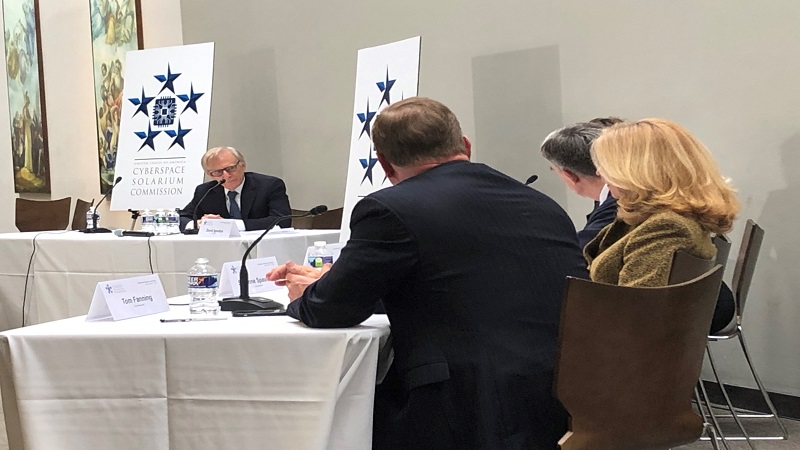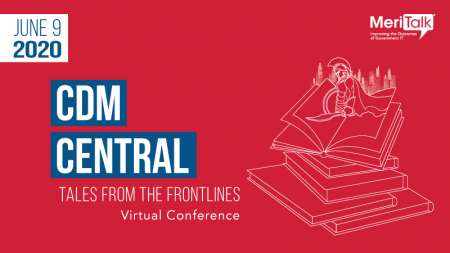
With several primary elections taking place today and the general election less than six months away, the group tasked by Congress to make recommendations to improve the nation’s cyber defenses made several additional recommendations to secure the 2020 elections.
“The 2020 election season will look unlike any other in American history,” said Rep. Jim Langevin, D-R.I., referencing the coronavirus pandemic. “Issues of voter access and cybersecurity are colliding with physical safety concerns, particularly for at risk populations.”
Langevin is one of the four members of Congress who serve on the 14-member Cyberspace Solarium Commission, established by the 2019 National Defense Authorization Act. The commission released its report of over 80 cyber-related recommendations on March 11, just days before the pandemic prompted mass telework across the Federal government. The disruptions of COVID-19 led the commission to devise several new recommendations for Congress, and highlight existing recommendations accentuated by the disturbances.
“In the pandemic annex, the commissioners highlight the need for immediate investments to ensure that we have secure, offline, remote voting options,” said Rep. Langevin, speaking the day before the document’s release at a June 1 online event hosted by the House Committee on Homeland Security.

State and local governments need an estimated $4 billion to secure elections, said Wendy Weiser, director of the democracy program at The Brennan Center for Justice at New York University, speaking at the same event. Weiser said ballot printing orders for mail-in-voting should be made this month, and no later than July.
Weiser called for $3.6 billion more than what has already been allocated in Federal funds, alluding to the $400 million in election funding provided by the Coronavirus Aid, Relief, and Economic Security (CARES) Act.
The HEROES Act passed by the House in May includes $3.6 billion in election security funding. Both the White House and Senate Majority Leader opposed the bill as passed by the House. Between the CARES Act and annual budget, Rep. Langevin noted that Congress recently approved more than $800 million in supplemental election security grant funding.
Weiser said the already appropriated supplemental funding was not enough, referencing an April study from a diverse group of organizations that examined election costs in Georgia, Michigan, Missouri, Ohio, and Pennsylvania.
“We found that the total cost of the changes in those five states exceeded $400 million,” Weiser told Rep. Langevin and committee vice chair Rep. Lauren Underwood, D-Ill. “Time is running out to ensure that these resources can make a difference.”
“We’re going to need to see significant investment, right now, in tools to actually enable election officials to manage this surge in absentee ballots,” said Weiser, echoing remarks of the Republican-appointed Chairman of the U.S. Election Assistance Commission Ben Hovland last week.
Hovland said costs would be significantly higher than the $400 million already appropriated. He said states are purchasing new equipment to process the increased vote-by-mail, such as mail sorters and high-speed scanners in addition to personal protective equipment (PPE) for poll workers.
Calling online voting efforts “appealing on the surface,” Rep. Langevin said they can ultimately undermine voter confidence, if implemented without proper planning. He also cited the Cybersecurity and Infrastructure Security Agency (CISA) guidelines that called internet voting “high-risk.”
The Solarium annex, released June 2, advocates for more than simply financial investments in order to secure elections.
“We also underscore the need for increased civics and media literacy education to help Americans cut through the foreign disinformation campaigns,” Rep. Langevin said.
A new Solarium recommendation calls for congressional support of nonprofit centers, which identify, expose, and explain malign foreign influence campaigns to the American public. The disinformation related to the coronavirus has highlighted government concerns about false information.
“We, as a nation, must internalize the lessons learned from this emergency and move forward to strengthen U.S. national preparedness,” the Solarium annex concludes. “It means investing in rigorously building greater resiliency in the government, in critical infrastructure, and in our citizenry.”
